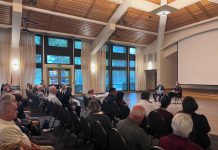Big days came often during the fall and winter in Meg Whitman’s
campaign to win this year’s Republican nomination for governor of
California. Or at least, there have been days that seemed to mean a
lot to the campaign, which spread press releases across the
landscape like a paper rainstorm.
Big days came often during the fall and winter in Meg Whitman’s campaign to win this year’s Republican nomination for governor of California. Or at least, there have been days that seemed to mean a lot to the campaign, which spread press releases across the landscape like a paper rainstorm.
They were about endorsements. The biggest Whitman day came when she won the nod of U.S. Sen. John McCain of Arizona, the former Republican presidential candidate who’s never had much luck winning votes on this side of the state line. The endorsement of former New York Mayor Rudy Giuliani was also big for Whitman; never mind that his endorsements of candidates like Bill Simon and Matt Fong didn’t help them much when they ran for governor and U.S. senator. Whitman also won over former Los Angeles Mayor Richard Riordan, another fellow who never pulled many votes outside his home town.
Not to be outdone, rival Steve Poizner, the current state insurance commissioner, announced backing by ex-Gov. George Deukmejian; Fong, the ex state treasurer, and onetime University of California Regent Ward Connerly, author of the Proposition 209 ban on affirmative action.
On the Democratic side, no endorsement was trumpeted more loudly than the one San Francisco Mayor Gavin Newsom got from ex-President Bill Clinton, announced at a community college in Los Angeles. Oddly enough, Newsom fell farther behind state Attorney General Jerry Brown in the next major poll. In the meantime, Brown hasn’t done much endorsement-seeking for himself, perhaps figuring he’s well enough known on his own.
So what about political endorsements? They have some usefulness in the early phases of a campaign, a sort of signal to candidates’ party mates that these are people to be taken seriously. Of course, in Whitman’s case, the almost $20 million she personally plopped into her war chest during the first half of last year was all the signal anyone needed about her ability to stay the course. She later put up another 20 very large ones.
But as for influencing the outcome of elections? Uh-uh. The man who learned that perhaps most bitterly was Paul Gann, co-author of the landmark property tax-cutting 1978 Jarvis-Gann Initiative known as Proposition 13. Just two years later, Gann figured he could parley his victory on that cause into a seat in the U.S. Senate. He had the enthusiastic endorsement of Ronald Reagan, the state’s most popular governor of the era, who also shared the 1980 ballot with him as a presidential candidate and carried California with 60 percent of the vote. But Gann took almost 20 percent less of the vote that year than Reagan, and Democrat Alan Cranston won reelection in a landslide that almost matched Reagan’s.
So personal endorsements don’t mean much. Especially ones from Giuliani, who probably didn’t score many points among Orange County Republicans when he wore a New York Yankees hat in the front row during the Yanks’ decisive Game Six victory over the Los Angeles Angels of Anaheim in the American League Championship Series last fall.
Of course, there are other kinds of endorsements, some of which can actually have measurable value. One example came the day Whitman sent out a three-page release listing almost 100 members of her new finance committee. This group presumably will try to contribute or raise enough cash to keep her from being considered a self-funded candidate in a state where billionaires have had little success buying offices. That will be a tough job since she’s said she’s willing to put up as much as $150 million to become governor. Why would donors give very much when they know how much Whitman has said she can spend from her own stash?
Whitman also put out a separate press release when Bob Naylor, a Sacramento lawyer/lobbyist and onetime Republican leader in the state Assembly, switched his endorsement to her from Poizner. That was of importance only to insiders.
Whitman and Poizner also purvey long lists of state and local officeholders. Poizner, for example, lists conservative state senators like Bob Dutton of Rancho Cucamonga, George Runner of Lancaster and Dennis Hollingsworth of Riverside and San Diego counties among others, perhaps in a bid to convince GOP voters he’s really a conservative.
The kind of endorsements that matter most in the end, though, come from labor unions, grass-roots voter groups and other organizations that can put volunteers in the field or help finance the slate cards that arrive by the armload in most homes at election time.
If those endorsements move a few voters, they are useful. But there is no evidence that celebrity or politician endorsements mean much of anything. Voters don’t usually pay much attention to who else is onstage at a rally besides the candidate. Unless it’s a rock band.
Which is why there’s no point paying attention to most endorsements. They’ll have little influence, just like always, no matter how much stock candidates put in them.
E-mail Thomas Elias at td*****@*ol.com. His book, “The Burzynski Breakthrough,” is available in a fourth edition. For more Elias columns, visit www.californiafocus.net.







